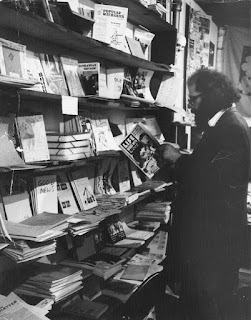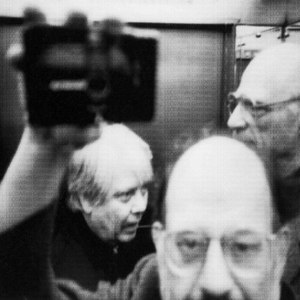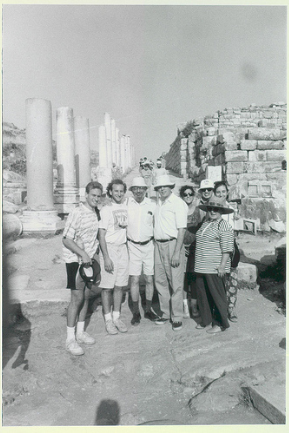[Allen Ginsberg]
[Steven Taylor]
[Andy Clausen]
[Anne Waldman]
This rare Naropa Institute audio-recording, (dated July 12, 1986), introduced by Anne Waldman and featuring Allen with Steven Taylor, (here dubbed “bodhisattva of music”), alongside the respectfully-noted "Naropa All-Star String Quartet", (and followed by a reading/performance by Andy Clausen), comprises the first half of a memorable night, which, among other things, saw the premiere of Steven's setting of Allen's poem, "White Shroud" (and an invigorating-as-ever reading/performance by Ed Sanders, which will be featured in this space tomorrow)
[Anne begins by introducing three participants (her introduction to Ed Sanders will be included tomorrow]
Anne Waldman: Allen Ginsberg, Guggenheim Fellow, member of the National Institute of Arts and Letters, author of Howl,Kaddish,Planet News, Fall of America, Mind Breaths,Plutonian Ode& the forthcoming White Shroud from Harper and Row. His Collected Poemswas also published by Harper and Row in 1985. He’s been quite peripatetic lately, traveling to Chinain the Winter of (19)85 (he toured and lectured at the invitation of the Chinese Writers Union), in the Fall of (19)85, he visited Russia. In recent years.. and recently, more recently, Nicaragua. Mr. Ginsberg is the co-founder of the Jack Kerouac School of Dismbodied Poetics, Naropa Institute, 1974 – The time, these times we have, these summer writing programs. seem to get more and more precious.. and fruition..more and more fruition level is going on… He has sung with Bob Dylan and The Clash He has recorded William Blake’s songs, as well as a double-album entitledFirst Blues for John Hammond Records. He’s been a major spokesman for the peace movement as well, as most of you know, is a member of the Buddhist Peace Fellowship and was involved at the Conference here [at Naropa], the strategies for peace-making. He’ll be continuing his teaching this week at Naropa Institute and reading and performing with other musicians at a rock club next Saturday night, the 19th, (so if you want to get more, stay tuned!)
Steven Taylor is a musician and composer. He has toured as accompanist with Allen since 1975. From 1980 to 1983, he wrote orchestral arrangements for the singer Judy Collins, and in 1984, as a member ofThe Fugs, he performed in concerts in New York and on tour in Europe. He’s traveling with Ed Sanders to Oslo in the next few weeks to perform a recent opera, entitled Star Peace, which he’s worked on with Ed Sanders, which premiered in the last May and he’s recently been co-producing music for the song-poetKenward Elmslie.
Andy Clausen was born in a Belgian bomb-shelter, came to the USA at the age of six, grew up in Oakland, has lived in Austin, Texas, and Boulder, Colorado. He’s the author of The Iron Curtain of Love,which is for sale outside at the tables up front. He’s recently taught a lively class with our [Naropa’s] writing program on Zaum, a Russian literary movement, and read the poems of Mayakovsky. He’s currently running a very wonderful series, poetry series, in Boulder called the “Boulder Literary Voices”, (which has a reading coming up tomorrow night at the BCAC [Boulder Community Arts Center], with David Cope, Niko Murray, and Alison Bennett,yes, Alison Bennett coming from New York). He’s recently been published inBombay Ginmagazine, a long association with the wonderful magazine New Blood which came out of Boulder and Long Shot magazine from New Brunswick is featuring some poems of his. So, without further ado, lets get this show on the road. Thank you. Please no smoking in here or taping . Thanks
[Allen begins his reading approximately four minutes in]
AG: To begin this evening of music and poetry. with Andrea Hennessyon bass, and Steven Taylor (who will be present for most of the evening accompanying, as bodhisattva of music, most of the poets). We’ll begin with “The Nurses Song” by William Blakewhich I usually end concerts, making use of that as a kind of mantra for community singing. So this is a sing-along with me and Steven and those of you in the audience who’ve sung this before. The last mantric line is “All the hills echoed” (or, for the rhyme, “All the hills echo-ed”. So please sing along with us when we get into it and we’ll make the building resound and begin the evening right.
[At approximately five minutes in, Allen starts singing - "When the voices of children are heard on the green…"]
[At approximately ten-and-three-quarter minutes in, he introduces "The Naropa All-Star String Quartet"]
"The next presentation with The Naropa All-Star String Quartet (Eric Balderson, cello, Gregory Munna, viola, Jean Harrison, violin, John Oliver, violin, Steven Taylor. composer of the music - words by myself )- "White Shroud". This is the premiere performance of this poemwith music."
[Allen goes on] - "The procedure of the evening – After my reading of this poem with The Naropa All-Star String Quartet, Andy Clausen will read, then Steven Taylor and Anne Waldman will have a song, then we’ll have an intermission (brief), and then we’ll present Ed Sanders, and Steven Taylor, working together with two other musicians who will be announced as we go along
[At approximately twelve-and-a-half minutes in, Allen begins his recital of "White Shroud", with the accompaniment of The Naropa All-Star String Quartet - (“I am summoned from my bed to the great city of the dead…”) , concluding at approximately twenty-three minutes in – (“I kissed him and filled my pen and wept”)
[Andy Clausen’s reading then follows (beginning at approximately twenty-four-and-a-half minutes in)]
AC: " I will begin with a short poem that I wrote upon the Space-ShuttleChallengercatastrophe– “There are thirty thousand people a day starving to death/Of course they don’t do it live on national tv.” – The next poem is ”In The Garden State – The Fourth Bardo” - (“No mirror is empty/the cold sky goes on without me”.. “I want New Jersey to know how much I love her".."Kiss me, New Jersey, kiss me”) – The next poem "is from the new “Long Shot” - "This poem’s entitled, “What Kind of Hermit?” (“What kind of hermit whacks off a lot?/What is the sounds of no hands clapping?..” ... “...No hands clapping. no mouth laughing, no one dying, no-one born”)
[At approximately twenty-nine-and-a-half minutes in] Andy reads “Sacred Relics” - (“Red-nosed busted blue derelicts supported by lamposts and buildings in the typewriter rain, reeking of fermenting urine…"... “..take this senseless agony, these bag-ladies and bag-less men, take them into your bomb-shelters,/ take them with you./Now you will need their experience, take them”) - followed by “She Walks By the Crew” –("I’ve just rounded off the tamping machine,/ our shovels hot as noon-time at a down-town fast-food grill,/ our faces glistening,/ a gulp of water not cool enough…”….”Pull the rope, Andy, time to start the machine.)”
[At approximately thirty-three-and-three-quarter minutes in, he reads] an untitled rant -
[At approximately twenty-nine-and-a-half minutes in] Andy reads “Sacred Relics” - (“Red-nosed busted blue derelicts supported by lamposts and buildings in the typewriter rain, reeking of fermenting urine…"... “..take this senseless agony, these bag-ladies and bag-less men, take them into your bomb-shelters,/ take them with you./Now you will need their experience, take them”) - followed by “She Walks By the Crew” –("I’ve just rounded off the tamping machine,/ our shovels hot as noon-time at a down-town fast-food grill,/ our faces glistening,/ a gulp of water not cool enough…”….”Pull the rope, Andy, time to start the machine.)”
[At approximately thirty-three-and-three-quarter minutes in, he reads] an untitled rant -
(“O the fugacious melon squash brain cancerdesultory desolate unswept sleepless streets in your cavernous bloody miasmic…"… "....I shall be paid She shall be paid We shall be paid..”… “every dollar, every deniro, every rouble, we are owed”)
[This is followed by a slightly longer piece, “Deconstruction of an Erection”, the recording of which gets interrupted (it concludes approximately forty-three-and-a-half minutes in with the line, "I'll see you in New York") - (“Well, I’m blue-balled blue, I sang,/ as the fruit of desire flew/too jumping hard to drive eighty miles an hour to the Apple and eighty back for a deconstructionist salon..”…”thinking of that deconstruction woman and all that white space”]
"I’m going to read one more and then we’ll do it, Okay? Is that good? Am I on time? (I'm not even going to look!) - Okay, this is called “Chest Organ’ - [Andy reads his Zaum poem, "Chest Organ"] - (“Infinite Zaum, perpetual future, down-home fuse, erectile blues, New Woman muse…”…”..And Zaum will be Woman of the Future!”)
* * * * * * * * * * * * * * * * * * * * *
The final piece in this first half (beginning at approximately fifty-two-and-a-half minutes in, and concluding at approximately fifty-six-and-a-quarter minutes in), similarly with Steven Taylor's accompaniment, is a piece by Anne Waldman, "a piece called “Bardo Corridor” ("I had my ego & two grams of hash/Sat down in a corridor..")
- Thank you.
[For the last, approximately, three minutes of the tape, Anne delivers, "just a little brief fund-raising announcement"… 1986 fund-raising for Naropa Institute]
[Audio for the above can be heard here, starting at the beginning, and concluding at approximately fifty-six-and-a-quarter minutes in (the last approximately three minutes of the tape being taken up by that brief (Naropa) fund-raising announcement)]
part two of this reading, (Ed Sanders), continues tomorrow
part two of this reading, (Ed Sanders), continues tomorrow




































































